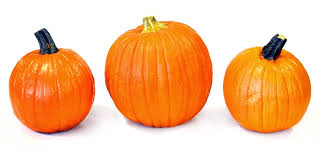It's not a common career path, but a Stirlingshire woman gave up a career in television and film to become Scotland's pumpkin queen.
Rebecca McEwen trained as a props buyer and worked on productions such as Monarch of the Glen, River City and Peter Mullan's Neds. But when she married a farmer, she threw herself into making a success of her new life and set about making farming fun.
Rebecca, 35, and Duncan, 34, wanted to modernise the way things were done at Arnprior Farm. Rebecca told the BBC Scotland news website: "We became a Forth Valley Monitor farm run by the Scottish Agricultural College and that made us review the farming system. "We got rid of cattle, increased sheep and started diversifying." The McEwens grew their first pumpkins in 2015.
Rebecca wanted to grow sunflowers or something they could sell on the roadside. So, Duncan came up with pumpkins and Rebecca came up with the extras on the patch - extras that help the working farm. She said: "We have dug your own tatties, pull your own turnips, and the kale maze. "The kale feeds the sheep in November. "So, kids run through the kale in October - we cut pathways through it - and once the pumpkin season is finished and the sheep are let into the field, they can eat any leftover pumpkins and the kale."
Until recently, the pumpkin patch was an American tradition. Rebecca had seen family photos of relatives in Philadelphia visiting the pumpkin patch. She thought families would love to visit a working farm and enjoy the autumn outdoors. But there is a nod to the Scottish location.
Rebecca explained; "We started the turnips because people would come in and complain, saying 'why do we have to follow America?'. "So, Duncan said let's grow turnips and we can give the Scots their turnips as well."
Arnprior Pumpkins reveals its crop to the public this weekend. After a long dry summer, the farm enjoyed a pumpkin boom. Visitors get to choose from 7,000 of them grown across four acres of land. Children can even play on a hay bale playground and feed the sheep. Rebecca thinks it's a great way to get the family outside.
In the spring they open their doors and let visitors help with the lambing and next year they'll let people stay in new glamping pods on the farm. One thing they've had to introduce to the pumpkin patch is welly boots hire, after a strange incident. "These two girls arrived in open-toed stilettos one year," explained Rebecca. "They couldn't believe it was a real farm, but they were brilliant and embraced it, had the best time. "But then had to get their feet pressure washed."
Read the text and match the phrasal verbs in bold to the following definitions.
1. To think of an idea or plan.
2. To stop doing a regular activity or job.
3. To remove or throw away something unwanted.
4. To do something actively and enthusiastically.
5. To start to do or deal with something.
6. To enter.
KEY
1. Came up with
2. Gave up
3. Got rid of
4. Threw herself into
5. Set about
6. Come in












